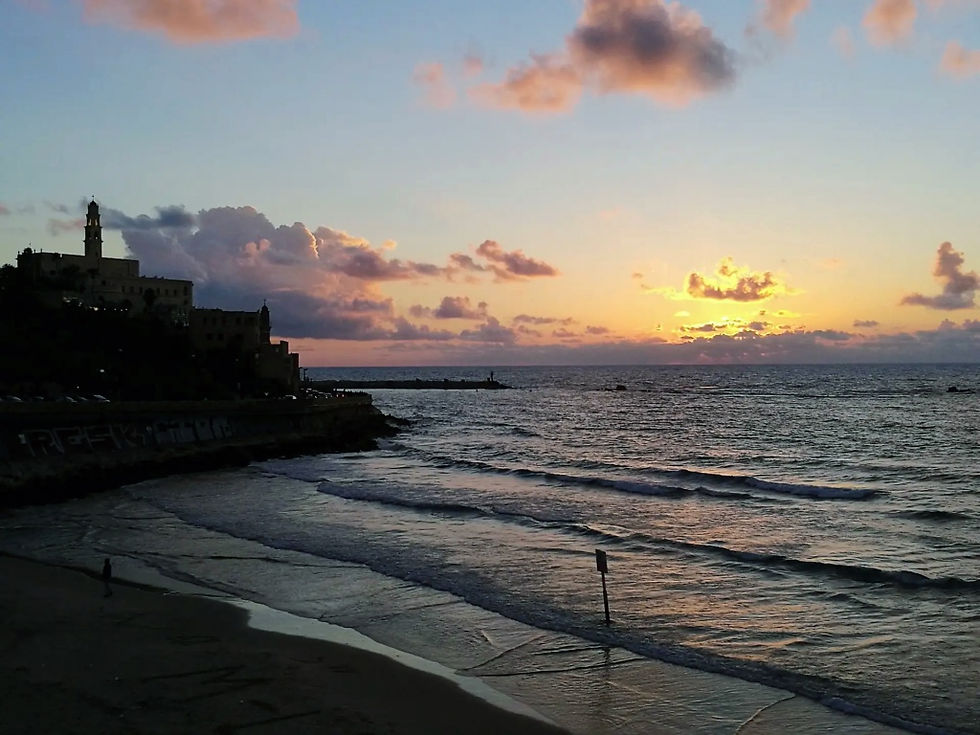Peace in Our Time
- Nir Yaniv
- May 17, 2021
- 4 min read

Originally published in Hebrew as a column in the Maariv-NRG newspaper, 2007.
They gathered on the abandoned seashore of Tel Aviv, dimly lit by a crimson sunset almost entirely hidden by the shiny skyscrapers across the waters to the west. Ten of them wore keffiyehs and ten – yarmulkes. The air was hot and humid. The fresh sea breeze cooled the new city on the artificial island to the west and largely remained there. What little wind reached Tel Aviv carried with it excess heat and a faint smell of frying shrimp.
The beach was littered with old plastic chairs, but the gathered men remained standing, silent, glaring hatefully at the glowing towers near the western horizon, the new city emitting irreverent music and unkosher food and an intolerable air of self-satisfaction. The oldest amongst the men remembered that in this, the new city wasn’t so different from the Tel Aviv of the past.
Eventually, someone broke the silence.
“This,” he said and pointed at the towers blocking the last rays of the sun, “this is what happens when people have no values. When no one cares for anything except for themselves.”
“This”, someone else answered, “is what happens when you demand peace no matter the cost. A coward’s peace. A dishonorable peace. This isn’t peace, it isn’t. It’s worthless.”
“And they took everything worth anything,” someone added. “They exploited this country, then ruined it, and then ran away to that godless, artificial place, the cowards.”
He turned his gaze towards the city beyond the waves. The top windows of the towers blinked in the dying light, as if insolently winking at him.
“Something must be done,” the first speaker said. Everyone nodded.
“Something must be done,” said someone else, a bit more emphatically. They all looked at the spitefully-joyous city, existing despite their best wishes, and then at the heavens that have ignored their prayers for years. Their frustration reached a boiling point.
“Something must be done!” they shouted, over and over again.
After some minutes the shouting gradually receded and someone hoarsely mumbled, “But what?”
“We’ll throw them into the sea!” said one of the Keffiyeh wearers.
“We all saw what happened last time you tried,” said one of the younger Yarmulke bearers.
“We’re getting better at it,” the first one answered. “Every dog has his day.”
“So that’s what you think?” Young Yarmulke said. “You better think again!”
He ran at his opponent, but their friends from both sides took quick action and separated them before any damage was done. The Keffiyeh wearer grunted and said loudly, “How, oh how did it come to be that Al-Yahood cowardly ran away,” he turned his head towards the west, emphatically, “and only you miserable bastards remained?”
“We are the true Jewish peoples!” the young Yarmulke shouted. “Only us, not them! Sinners! Assimilators! Haters of the true Israel!”
Eventually, someone silenced him by sitting on his chest.
“Maybe we could send commando motorboats,” said someone else, slightly more practical. “We can fill them with explosives, send them to their east shore. Under their radar. It’ll hurt, kill their tourism.”
“We tried it. Didn’t work. The entire circumference of the new island is filled with sonar and mines.”
“I know – we can use gliders!”
“Nope. They’ve got lasers.”
“What?”
“Check this out,” said a keffiyeh wearer who hadn’t spoken so far, and took a rifle out of his bag.
“Relax,” he told the yarmulke boys who jumped at the sight of the weapon. “It’s just a demonstration.”
He pointed the rifle west, at a point above the shining towers. “Look,” he said, and pressed the trigger.
They couldn’t see the bullet, which was fired in absolute silence, but they all saw the flash of light which destroyed it well before reaching the farther shore.
“You’ve got to admit that they’re good, those Jews,” said one of the keffiyeh wearers. “They went away, built this New Tel Aviv, and left us stuck here with you zealots and with the holy places.”
“You’re the zealots!” said one of the Yarmulkes.
“And they are not real Jews!” shouted another.
“Those Israelis.”
“Oh, fine.”
“And if you’re not into the holy places,” added another Yarmulke, “what have we been fighting for a hundred years for?”
“That’s the problem with this so-called ‘peace’,” someone said. “Those secular rich bastards took their money and moved away, left us here with a ruined country, and everyone wants a visa to their new city, instead of keeping the faith right here.”
“I know!” said one of the Yarmulkes. “Biological weapons! It’ll be like the ten plagues of Egypt, blood, boils, pestilence, death! I’m sure we can find some first-grade biohazard in Iraq or Eastern Europe or…”
His comrades silenced him and apologized to their friends-enemies. There’s always some fanatic who spoils everything.
“We can ignore them just like they’re ignoring us,” someone said. “We’ll fight here like men over the holy places and be done with it.”
But this idea, while theoretically fitting with everyone’s beliefs, did not practically appeal to anyone. Not even to the fanatic.
Eventually they turned away from the western vision, got back to their homes in the mostly abandoned city of Tel Aviv-Jaffa, and went to bed, frustrated but rather unexcited. They’ll continue the discussion tomorrow. Something must be done.
And the city beyond the waves, proud and noisy, utterly devoid of morals, honor or respect for any religion whatsoever, continued its existence, unperturbed. One day something will be done, someone will do something. But until then – who cared?

Comments